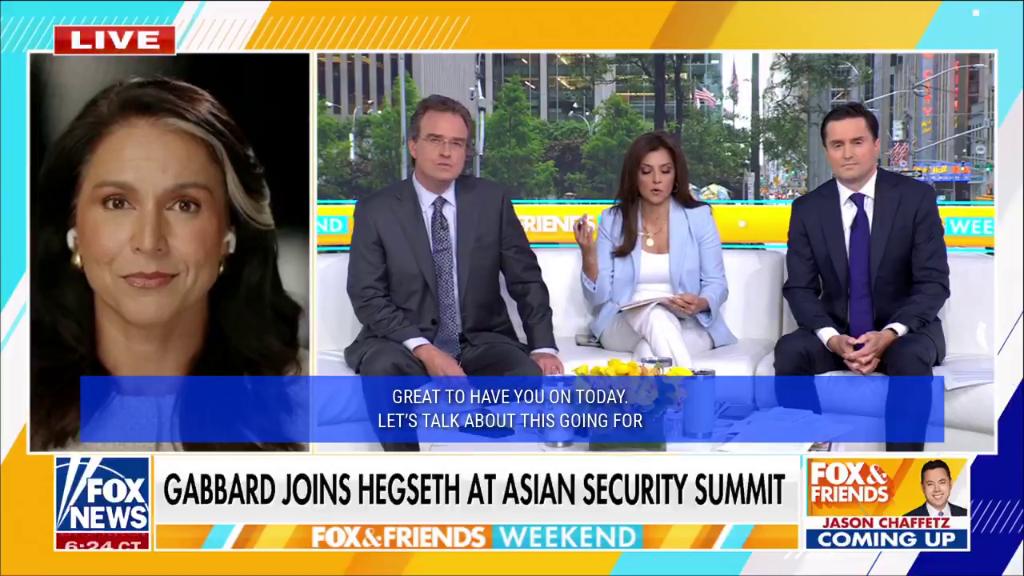DNI Tulsi Gabbard breaks down President Donald Trump’s policies on the world stage:
Reporter: “Good morning Tulsi, it’s so great to have you on today. So let’s talk about this, because what I loved about what I’m hearing out of this conference from you and from Pete is, ‘Hey, we’re ready, we want peace, but we’re going to do it through strength, and sort of standing up to China but also calling on the Asian communities and the Asian leaders who are also going up against China to do their part.’ Give us more information on what you see going on there.”
Tulsi Gabbard: “Thanks Rachel, it’s great to join you here. Really, the overarching message is very consistent with what President Trump has been speaking about throughout his administration and his term in office, which is that he wants to be the president of peace. And we see this evidence on many different fronts as he is leading negotiations towards peace agreements, and that’s no different here in the Indo-Pacific. As you know, I grew up in the Pacific. I’ve been born and raised out here; Hawaii is my home. And so I have a very unique and personal understanding of this region and how unique each of these countries are, the nuances that exist, the complexities of these relationships today, specifically because of history and those relationships. And so being here at conferences like this, at the Shangri-La Dialogue, are absolutely critical as we look towards that objective of peace and stability because it opens the door for these one-on-one conversations with leaders from each of these different Indo-Pacific countries. There are over 40 countries who are present here, over 500 people, and that dialogue, that diplomacy, that increasing of understanding between us as countries is what is essential towards making progress towards that peace and stability, reducing the likelihood of misunderstanding, miscalculation, and decisions being made based on either bad information or really just not understanding, ‘Hey, what is the nuance that we need to see here that we may not be catching through the headlines?’ And that’s really where again, you go back to President John F. Kennedy’s focus on diplomacy, you look at leaders like Ronald Reagan, those who have chosen diplomacy, chosen to have these direct discussions. Again, as President Trump is leading in many different regions of the world, this is an opportunity for us to do that and what we are doing here in the Indo-Pacific region now.”
Reporter: “Director Gabbard, it’s Lucas Tomlinson here in New York. I have a question: you said the US wants peace; do you think China wants peace?”
Tulsi Gabbard: “China has made it very clear that they don’t want war. We have made it very clear that we don’t want war. And again, this is why times like this are so critical to be able to have direct engagement not only between the United States and China, but between the United States and Singapore, Thailand, Vietnam, India, Cambodia, Malaysia, Brunei—all of these different countries who are the Indo-Pacific and many of whom have good relationships with China, good relationships with the United States, economic relationships with China, economic relationships with the United States. And this is why this dialogue, specifically, I have found to be very beneficial and very productive because it allows us to have this direct conversation, talk through these areas of shared interests, talk through areas where we may have some differences, and better understand where we’re coming from and the landscape that we are operating in. The thing that I have found here over these last couple of days is we have far more in common interests than we do differences. We’re talking about things like counter-narcotics, we’re talking about the continued threat of Islamist terrorism in many of our countries. These are areas where we’ve had longstanding concerns that continue today, and areas where we have the opportunity to be able to work together, ultimately again, towards that mutual shared interest, which is for our respective peoples’ the ability to live in a peaceful, prosperous, and free society.”
Reporter: “I want to change topics real quickly and get your response to this: You’re in the process of declassifying Biden administration documents that labeled COVID dissenters in the United States as possible domestic violent extremists. Tell us why that’s so important.”
Tulsi Gabbard: “You know, when we look back over these last four years, and many of us have had direct experience with this, we look at the censorship of Americans, the undermining of our First Amendment rights, social media companies being used by the Biden administration to silence voices that were dissenting to or criticizing some of the Biden administration’s policies. The documents that we are declassifying—we’ve just done three over these last couple of weeks—really get to how they did what they did, the groundwork they laid out in ultimately labeling those who criticize the Biden administration’s policies on everything from COVID vaccine mandates to those criticizing the Biden administration’s open borders as those who are likely to become domestic violent extremists and how they weaponized the national security state, the intelligence community, federal law enforcement against everyday Americans simply exercising our fundamental First Amendment rights guaranteed by the Constitution. And so these documents really get towards what President Trump promised the American people in maximum transparency and help us move towards that objective of accountability and bringing about an end to this, better understanding how they used the levers of government to weaponize against those who disagreed with the government’s policies under the Biden administration, it really brings clarity to us being able to hold leaders accountable and not allow them to do this in the future again.”
Reporter: “Well, thank you to President Trump’s Director of National Intelligence, Tulsi Gabbard. Aloha.”
Tulsi Gabbard: “Thank you, Aloha.”
